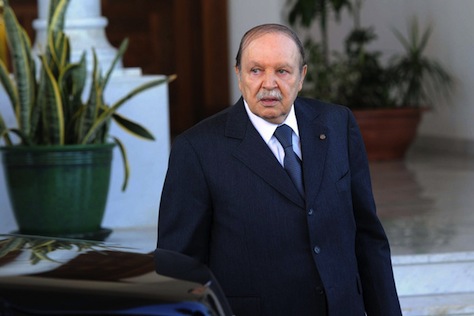Though Algeria quickly became one of the first countries where the ‘Arab Spring’ protests gained momentum three years ago, its longtime president Abdelaziz Bouteflika is almost certain to win a fourth term in Thursday’s presidential election. ![]()
Algerians, like many others throughout north Africa and the Middle East, coalesced in protest of higher prices, massive unemployment and the general lack of economic progress. But with memories of Algeria’s brutal, decade-long civil war of the 1990s still fresh, it was enough for Bouteflika (pictured above) to agree to end the 19-year period of ’emergency rule,’ lift some of his government’s more oppressive measures against political expression and introduce subsidies to lower the price of food and other necessities.
Besides, most Algerians thought, he would be too old at age 77 to run for a fourth term. Nonetheless, despite a campaign to convince Algerian voters to boycott tomorrow’s vote, Bouteflika will theoretically extend his rule through 2019.
But Bouteflika’s reelection campaign says less about Bouteflika than it does about the power struggle bubbling beneath the surface. Frail and unable to walk, Bouteflika suffered a stroke last year and spent four months receiving medical treatment in Paris. No one thinks he’ll last another five years. At a recent meeting with US secretary of state John Kerry, he could barely stand up or and he seemed unable to speak clearly.
So why not groom a successor and let Bouteflika slip into a comfortable retirement?
There’s simply still too much disagreement over who should replace Bouteflika within the political and military ruling class. Remarkably, the spat over Algeria’s future has spilled into increasingly public view. Bouteflika recently stripped the powerful — and mysterious — general Mohamed Mediène of some of his duties as the head of Algeria’s internal intelligence service, the Département du Renseignment et de la Sécurité (DRS), for the past 23 years. Mediène’s loss was the gain of Ahmed Gaïd Salah, the chief of staff of Algeria’s military, which is allied with the ruling Front de Libération Nationale (FLN, National Liberation Front, جبهة التحرير الوطني).
With battle lines drawn between the DRS elite and the more general military leadership, it was probably easier to back Bouteflika for reelection while the fight over succession continues behind (mostly) closed doors. The man leading Bouteflika’s campaign, Abdelmalek Sellal, Algeria’s prime minister between September 2012 and March 2014, is a longtime Bouteflika ally and was once thought to be a potential successor, but he’s so unpopular that he’s cut back public appearances as the election approached.
In a country with such high unemployment, especially among its youth, a socialist economy that’s slowed potential growth, and a reliance on oil and gas revenues that’s crowded out investment in other economic sectors, plenty of Algerians are weary for change. Bouteflika’s trump card has always been the specter of a return to the civil war of the 1990s. Bouteflika’s regime may be sclerotic, unresponsive and authoritarian, but it’s better than the alternative of a bloody fight between the secular government and Islamists.
On the other hand, Bouteflika’s legacy both as a member of the generation that fought for and won independence and as the leader that ended Algeria’s civil war have also insulated him from wider unpopularity that a new leader might face.
While most of Algeria’s opposition parties are advocating a boycott of the election, including a new protest movement within Algeria’s relatively small middle class, Barakat (Algerian slang for ‘Enough’), none of them are incredibly well-placed to challenge the ruling FLN regime that, with the exception of the 1990s, has governed Algeria since its bloody break from French colonialism in the 1960s. Bouteflika, it’s worth noting, won 90.2% of the vote in 2009, and 85.0% of the vote in 2004. So no one seriously doubts the outcome of Thursday’s election.
The more interesting number will be turnout — it reached 10.51 million in 2004 (58.1%) and 15.35 million in 2009 (74.5%). If turnout falls below 2004 levels, it could be at least a symbolic victory for Algeria’s puny opposition, and it could embolden the more reform-minded among Algeria’s ruling class, to the extent they exist.
But so long as the succession fight remains a power struggle among the DRS, the military, the FLN, other minor governing parties and the Bouteflika family, don’t expect too much change. Though there are a dozen or more potential consensus candidates, including former three-time prime minister Ahmed Ouyahia, you should expect that Bouteflika’s successor, whether he’s named tomorrow, next week, next month or in five years, will be a relatively older insider who’s trusted to balance all the interests that comprise Algeria’s behind-the-scenes power. That doesn’t exactly bode well for a massive shift toward economic liberalization.
That’s not perhaps the most fulfilling outcome for a country that seems so incredibly in need of reform. But it’s still the most likely path — at least until any capable opposition emerges. Even then, a credible opposition would likely have to win over Algeria’s military through shady concessions.
Next-door, Tunisia is inching its way toward what looks increasingly like a moderate Islamic democracy, though it nervously awaits full elections later this year. But in comparison to the other north African states where the 2011 ‘Arab Spring’ protests swept longtime leaders out of power, Algeria’s not doing quite so poorly.
Egypt, after experimenting with electing a government dominated by the Muslim Brotherhood, is now almost certainly headed for a quasi-authoritarian military regime. Libya hasn’t even emerged from its interim government phase, local militias are the only real source of security, and oil production is nearly halted due to revolts for greater autonomy in the oil-rich east.
Photo credit to Farouk Batiche / AFP.
